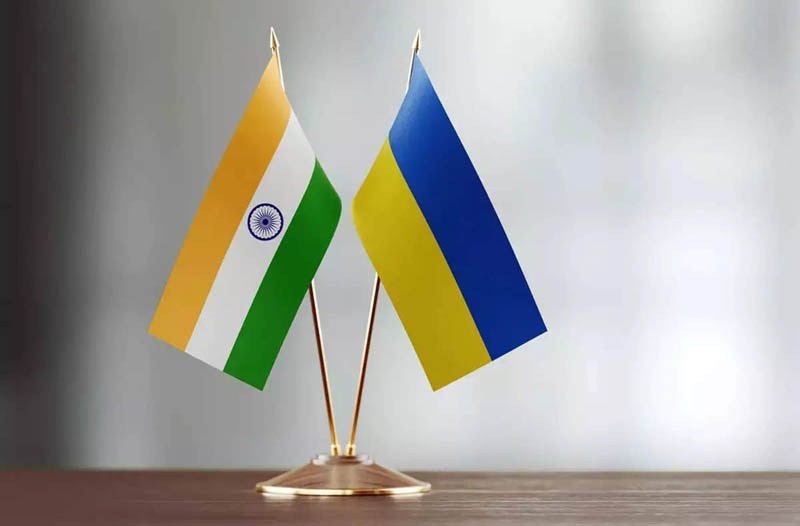Ход слоном: что стоит за визитом Кулебы в Индию


28-29 марта министр иностранных дел Украины Дмитрий Кулеба посетил Индию. Его визит уже можно считать знаковым, потому что подобных поездок не было с 2017 года. В повестке дня возобновление довоенных отношений, вовлечение Индии в Формулу мира Зеленского, а также, что вполне логично, российский вопрос.
Различные оценки
По итогам прошедших встреч Дмитрий Кулеба уже заявил об изменениях отношения Индии к полномасштабной войне РФ против Украины. По его словам, «возможно, нам в Украине хотелось бы, чтобы эти изменения были быстрее, ярче, но у Индии своя внешняя политика, свои интересы».
«Задача номер один – вернуть уровень сотрудничества стран к довоенному. Вторая задача – работать над новыми совместными проектами и программами. Третий вопрос – это Формула мира», — отметил Дмитрий Кулеба.
В то же время его индийский визави Субраманьям Джайшанкар был более «сух» в своих оценках.
«Наши дискуссии были сосредоточены на продолжающемся конфликте и его более широких последствиях. Обменялись мнениями о различных инициативах в этом контексте. Говорили также о глобальных и региональных вопросах, представляющих интерес для нас обоих», — написал Джайшанкар в соцсети Х (бывший Twitter).
Именно политическая составляющая взаимоотношений кажется ключевой на ближайшую перспективу. Дело в том, что Украина организует глобальный саммит мира летом. Индия на нем – один из важных участников, ведь для Нью-Дели актуальны по крайней мере два пункта Украинской формулы мира из десяти – экологическая и ядерная безопасность.
«В принципе, они (представители Индии – «Апостроф») участвовали во всех встречах с обсуждением Формулы мира, начиная с Копенгагена в прошлом году. То есть абсолютно есть надежда, что они и в этом саммите будут участвовать. На них полагается, я так понимаю, более посредническая роль в этих переговорах. Не просто самим принять участие, а показать пример другим странам», — отмечает в разговоре с «Апострофом» заведующая отделом новых вызовов Национального института стратегических исследований Елена Бордиловская.
Посредничество как фактор во время выборов
Многие страны Азии, Африки и Латинской Америки могут брать пример с Индии и ее позиции по России и Украине. К слову, подобным образом украинская дипломатия действует на Ближнем Востоке – через Саудовскую Аравию.
«Дмитрий Кулеба несколько раз так намекнул, что рассчитывает на посредническую роль Индии в переговорах с Россией. То есть, по факту уже этого саммита возможно, чтобы индийская сторона как-то донесла в Россию важные для нас месседжи», — говорит Елена Бордиловская.
По ее словам, интерес нынешнего руководства Индии – обрести дополнительный престиж, а также использовать этот фактор на парламентских выборах, которые продлятся до лета этого года.
«В Индии такими шагами очень гордятся, они показывают, что, видите, у нас есть такие возможности – говорить и с теми, и с теми. Буквально через три недели в Индии начинаются выборы, на которых Нарендра Моди со своей партией собирается переизбраться. И ему важно показать, что у него очень успешная внешняя политика. Что он смог довести Индию до такой высоты, когда индийские дипломаты спокойно разговаривают с американцами и россиянами», — подчеркивает Елена Бордиловская.
К слову, накануне визита Дмитрия Кулебы премьер-министр Индии Нарендра Моди по телефону общался с президентом Владимиром Зеленским. И в тот же день Моде звонил Путину, чтобы поздравить его с переизбранием президента.
Украинские танки как фактор оскорбления
Другая цель, о которой заявил Дмитрий Кулеба – восстановление довоенного уровня отношений. И именно здесь наблюдается больше всего вызовов.
С самого начала полномасштабного вторжения Индия занимала позицию стратегического нейтралитета. По-другому и быть не могло. Последние 30 лет украинские дипломаты мало внимания уделяли этому направлению, хотя обучение индийских студентов в наших вузах проходило, аграрный и машиностроительный экспорт из Украины постепенно шел.
Серьезным ударом по отношениям с Индией стали поставки 320 украинских танков Пакистана в 1996 году. Напомним, с этой страной в Индии было 3 широкомасштабных войны за спорный регион Кашмир.
«Где-то до 2012 года у нас не было ни политических, ни экономических отношений. Даже межправительственные комиссии не проводились. Я как раз работал в Министерстве экономического развития, в торгово-экономическом департаменте, и получил задачу восстановить эти отношения. И только через 9 лет нам удалось провести межправительственную комиссию. Так вот, Индия перед комиссией говорила нам: «вы продали танки нашим врагам и мы с вами не хотим иметь никаких отношений. А россияне нас поддерживали всегда, мы с россиянами и будем опираться на них», — описывает ситуацию в разговоре с «Апострофом» эксперт-международник Руслан Осипенко.
И хотя о возобновлении заседаний комиссии договорились, последняя подобная встреча прошла еще в 2018 году.
До полномасштабного нападения России основу нашей торговли составляла машиностроительная и аграрная продукция. Объемы были слишком малы, чтобы влиять на политическую позицию Индии. И еще больше упали они сейчас.
«Я сам вел переговоры с Индией. Они нам предлагают шкуры буйволов, свой чай, такие вещи. А мы им – высокотехнологичную продукцию, например, двигатели «Мотор Сичи». «Хартрон» что-то предлагал. А оружие мы не могли продавать, потому что раньше снабжали Пакистан», — делится опытом Руслан Осипенко.
Россия активно использовала культурные сантименты с советских времен и продавала Индии свое оружие. От вертолетов и самолетов до военных кораблей и подводных лодок. Именно этот фактор достаточно важен. По данным SIPRI, в течение последних двух десятилетий Россия поставляла 65% оружия, закупленного Индией.
Иметь русское оружие – значит постоянно зависеть от Москвы в комплектующих, обслуживании и т.д. Поэтому неудивительно, что в 2022 году страна воздерживалась от критики Кремля. А еще увеличила экспорт сырой нефти из России, хоть и с выгодными для себя скидками.
Тем не менее Индия отправила в Украину более 10 партий гуманитарной помощи. И это вместе с визитом Кулебы дает определенные основания рассчитывать на изменения в отношениях.
Смена позиций
В последние годы позиция Индии несколько меняется. Не столько благодаря Украине, а больше из-за действий наших союзников. США активно пытаются привлечь Индию в альянс против Китая. И это автоматически влияет на индийскую позицию относительно союзника, то есть вассала Китая – россии.
«Индии просто предложили такие возможности, от которых она просто не хотела бы отказываться — стать страной номер один в Юго-Восточной Азии. Чтобы сбалансировать Китай, Индию сейчас будут поднимать, скажем так, экономически, политически и технологически. То есть, пойдут туда инвестиции и технологии», – говорит Руслан Осипенко.
Еще в 2022 году появилась инициатива Большой семерки по вложению в течение 5 лет 600 млрд дол. в инфраструктуру стран Глобального Юга.
«Фонд должен был обеспечить меньшее влияние Китая на страны, которые находятся на его внешнем контуре. Тот же Вьетнам, Таиланд и Индия. И эти деньги должны были потратить на создание параллельного транспортного коридора, который будет параллелен китайскому так называемому шелковому пути, который бы брал начало в Индии», — подчеркивает эксперт.
Однако сейчас этот транспортный коридор пока что заблокирован из-за разжигания конфликтов на Ближнем Востоке действиями России и Ирана. Но от этих идей очевидно никто отказываться не собирается.
Не в последнюю очередь благодаря США изменилась позиция Нью-Дели и по отношению к российской нефти. С начала года почти все индийские компании перестали ее покупать из-за опасений санкций. В следующем месяце в Индию прибудет около 7,6 млн баррелей американской нефти, что является самым высоким показателем за последний год.
Но более важным на более длинную перспективу является оборонное сотрудничество США с Индией. И здесь тоже видны изменения. В июне прошлого года премьер-министр Индии Нарендра Моди посетил США. Среди прочего две страны согласились совместно производить в Индии двигатели для американских истребителей. Индия также разрешила ремонтировать корабли ВМС США на индийских верфях и приобретет дроны американского производства. И это в дальнейшем может снизить зависимость Индии от российского оружия. Более того, открывает дополнительные возможности для Украины. Не напрямую, а при посредничестве американских компаний, сотрудничающих как с Украиной, так и с Индией.
В общем, фактор США в отношениях Украины и Индии может быть важнее, чем кажется. Если Вашингтон в своих интересах может влиять на Нью-Дели против России, то почему бы этим не воспользоваться. Вместе с тем, полного разрыва отношений Индии с россией в ближайшие годы ожидать точно не стоит: слишком давние и масштабные отношения сложились между Нью-Дели и Москвой.
Recent Posts
Сбежавший в Швейцарию блогер Станислав Домбровский просит прощения у украинцев
Одесский трэш блогер Стас Домбровский, который в последнее время проживает в Швейцарии, записал видеообращение к…
Александра Устинова и атака на руководство АОЗ: что стоит за волной критики
Александра Устинова, народная депутат, которая в последние дни активно атакует Агентство оборонных закупок (АОЗ) возможно…
Журналисты показали имение киевской судьи, закрывшей дело Приходько
Свобода "под ключ" или манипуляция правосудием? Борис Приходько – нацбанкир времен Януковича и действующий нардеп…
Судьи вне закона
В течение последних трех лет внимание общественности если и бывает приковано к судам, то гораздо…
Артем Ляшанов и bill_line спасают репутацию через суд
Финтех-компания столкнулась с обвинениями в отмывании денег игорной мафии. ООО «Тех-Софт Атлас» (ТМ «bill_line») и…
Криптобиржа WhiteBIT: как Владимир Носов и «регионалы» Шенцевы отмывают деньги и помогают спецслужбам России
Владимир Носов в Украине пытается позиционировать себя как респектабельный бизнесмен и хозяин криптобиржи WhiteBIT. Однако…


